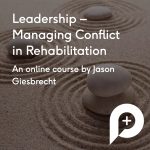Do unpleasant conversations really change anything? Find out in our new course from Jason Giesbrecht.
Courageous conversation is one that is often difficult and inconvenient, but is often the key to overcoming obstacles on the way forward. There are often emotions on both sides of the conversation and can be uncomfortable, stressful or challenging situations.
By attending this brand new and exclusive course, you will have the knowledge and skills to confidently have a bold conversation in your work or personal life and pave the way forward.
The tutor – Jason Giesbrecht
Jason is a seasoned senior health manager and physical therapist with over 23 years of experience leading teams in large and complex health systems. He has worked successfully in virtually all health sectors and held numerous senior positions such as regional director, executive director, health services administrator and chief operating officer.
During all of his courses, Jason will share his knowledge and experience with you in order to improve your ability to hold challenging conversations, improve team dynamics, and reflect on your own path to leadership.

The new leadership course
Courageous talks
 Courageous conversations are usually difficult and unpleasant conversations. We often fear it or at least stew about it for days or weeks before the discussion actually takes place. They generate emotions on both sides of the conversation and are usually associated with uncomfortable, stressful, or challenging situations. It can be tempting to avoid and postpone this discussion in the hopes that the situation will resolve itself. Most of the time the leader has a goal or desired outcome that needs to be achieved in the discussion. This can be a change in behavior, a certain action must be taken, or possibly a change in attitude. Being open, authentic, and honest while maintaining an atmosphere of trust and respect can be daunting for many leaders.
Courageous conversations are usually difficult and unpleasant conversations. We often fear it or at least stew about it for days or weeks before the discussion actually takes place. They generate emotions on both sides of the conversation and are usually associated with uncomfortable, stressful, or challenging situations. It can be tempting to avoid and postpone this discussion in the hopes that the situation will resolve itself. Most of the time the leader has a goal or desired outcome that needs to be achieved in the discussion. This can be a change in behavior, a certain action must be taken, or possibly a change in attitude. Being open, authentic, and honest while maintaining an atmosphere of trust and respect can be daunting for many leaders.
Navigate through these tricky conversations
Jason's other courses
Balance time and workload
 Time is a scarce commodity and in this digital age life seems to get even busier. Effective time management is an important skill in getting the most out of your available time and has been shown to reduce stress, anxiety, and even depression. There are many different time management strategies and tools, each with their advantages and disadvantages, and addressing different aspects of time management. In this course, Jason Giebrecht will teach you the Time Optimization Roadmap, which he developed from trying a variety of time management strategies and tools.
Time is a scarce commodity and in this digital age life seems to get even busier. Effective time management is an important skill in getting the most out of your available time and has been shown to reduce stress, anxiety, and even depression. There are many different time management strategies and tools, each with their advantages and disadvantages, and addressing different aspects of time management. In this course, Jason Giebrecht will teach you the Time Optimization Roadmap, which he developed from trying a variety of time management strategies and tools.
Improve your time optimization
Conflict management in rehabilitation
 When people get together, conflicts often arise. In health care, conflicts between health care professionals and support workers can arise during the health care process and lead to serious problems with significant consequences. A good leader can identify the causes of conflicts and support a conflict management process in which all parties feel that they are heard and that their needs are met. This course shows you different conflict management styles and behaviors and takes you step by step through a conflict management process.
When people get together, conflicts often arise. In health care, conflicts between health care professionals and support workers can arise during the health care process and lead to serious problems with significant consequences. A good leader can identify the causes of conflicts and support a conflict management process in which all parties feel that they are heard and that their needs are met. This course shows you different conflict management styles and behaviors and takes you step by step through a conflict management process.
Resolve conflicts with these skills
Personal values and convictions
 Personal values are broad goals that represent what is important to someone. Beliefs are thought constructs that people apply to themselves, others, the world, or the future. Personal values and beliefs help guide our behavior and decisions. A person's beliefs can be positive or negative, and true or false. By analyzing beliefs for their polarity and accuracy, one can see where improvements can be made in their life. This can be achieved by reformulating untrue beliefs and recognizing negative, true beliefs as an opportunity for change.
Personal values are broad goals that represent what is important to someone. Beliefs are thought constructs that people apply to themselves, others, the world, or the future. Personal values and beliefs help guide our behavior and decisions. A person's beliefs can be positive or negative, and true or false. By analyzing beliefs for their polarity and accuracy, one can see where improvements can be made in their life. This can be achieved by reformulating untrue beliefs and recognizing negative, true beliefs as an opportunity for change.
Values and beliefs make a difference
Emotional intelligence
 Emotional intelligence (EI) is the ability to recognize, understand and manage the emotions of oneself and others. It is developed for a lifetime and can be learned and improved. Emotional intelligence has been shown to have a positive impact on job performance, leadership, relationships, patient satisfaction, and mental health. This course aims to describe and define EI. It will examine the role of EI in effective leadership. It will help you identify areas of EI strength and ways to improve EI in yourself and develop an action plan to improve EI and leadership effectiveness
Emotional intelligence (EI) is the ability to recognize, understand and manage the emotions of oneself and others. It is developed for a lifetime and can be learned and improved. Emotional intelligence has been shown to have a positive impact on job performance, leadership, relationships, patient satisfaction, and mental health. This course aims to describe and define EI. It will examine the role of EI in effective leadership. It will help you identify areas of EI strength and ways to improve EI in yourself and develop an action plan to improve EI and leadership effectiveness
How emotionally intelligent are you?
Therapeutic Alliance
 Ally is an essential skill
Ally is an essential skill